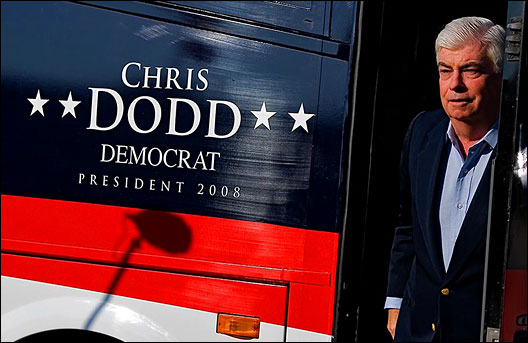
Update: Chris Dodd dropped out of the presidential race on Jan. 3, 2008.
Democratic presidential candidate Chris Dodd, who has represented Connecticut in the U.S. Senate for 26 years, racked up a 93 percent rating from the League of Conservation Voters in the last Congress and a 77 percent score for his whole career. He hasn’t been a leader on environmental issues over the years, but he seems bound and determined to make up for that in the current presidential campaign, in which he’s been the lone voice calling for a corporate carbon tax and has advocated a higher fuel-economy target than his opponents.
Read an interview with Chris Dodd by Grist and Outside.
Key Points
- Advocates a corporate carbon tax, which he estimates could bring in about $50 billion a year. The proceeds would be spent on renewables and energy-efficient technologies.
- Aired the first-ever presidential campaign ad to focus on global warming.
- Calls for raising fuel-economy standards for automobiles to 50 miles per gallon by 2017.
- Cosponsor of the Boxer-Sanders Global Warming Pollution Reduction Act, the most stringent climate bill in the Senate. It would establish a cap-and-trade system for greenhouse-gas emissions and require the U.S. to reduce its emissions to 1990 levels by 2020, and to 80 percent below 1990 levels by 2050.
- Opposes investment in coal-to-liquid technology or programs.
- Would require new coal power plants to capture and store carbon emissions.
- Supports a goal to get 20 percent of the U.S. electricity supply from renewable sources by 2020.
- Made his campaign carbon neutral in June 2007.
Video and Audio
Watch Dodd’s climate-change campaign ad:
Watch Dodd answer a question about cutting energy use at the CNN/YouTube debate on July 23, 2007:
Quotable Quotables
- “I believe I’m the only [presidential candidate], along with Al Gore, who has called for a corporate carbon tax. You’ve got to tax polluters. You’ve got to separate the price differential so that we can move away from fossil fuels that do so much damage to our environment, to our economy, to our future, to jobs in this country. Until you deal with the issue of price, until you impose a corporate carbon tax, we will never get away from fossil fuels. It’s the only way this can be achieved. You have to advocate that if you’re serious about global warming.”
— July 23, 2007, in a CNN/YouTube debate between Democratic candidates
Platform & Record In-Depth
- Opposes oil drilling in the Arctic National Wildlife Refuge.
- Believes nuclear power should be considered as one option to help reduce global warming. Has expressed worries about nuclear waste and says more R&D must go into finding a safe way to dispose of it.
- Calls for government support of ethanol, cellulosic ethanol, biobutanol, and other biofuels with the goal of using 8.5 billion gallons of biofuel in U.S. cars and homes by 2008, increasing to 36 billion gallons by 2022. Says biofuels must be produced in a way that drives down carbon emissions from production to use, and calls for “an increasing portion” of them to be advanced biofuels like cellulosic ethanol by 2016.
- Calls for a freeze in U.S. electricity consumption by 2010, made possible by efficiency.
- Would tighten efficiency standards for appliances, light bulbs, and other consumer products in order to save energy.
- Calls for eliminating dependency on Mideast oil by 2015.
- Would impose high energy-efficiency standards on all new federal government buildings, and retrofit older buildings with the latest energy-efficiency technologies. Cosponsor of bills that would make government-owned buildings more energy-efficient.
- Calls for all new federal government vehicles to be hybrid or electric, run on E85 or other biofuels, or use other clean, alternative technologies.
- Calls for incentives and tax rebates for Americans who purchase highly efficient automobiles.
- Wants to launch a training program that will teach electricians, automobile mechanics, plumbers, and construction workers to install, repair, and maintain energy-efficient goods.
- Calls for bolstering mass-transit systems across the country.
- Wants to make the Production Tax Credit permanent for clean and renewable sources of energy.
- Cosponsor of the Clean Air Planning Act of 2007, which would implement a cap-and-trade system to reduce emissions of carbon dioxide, nitrogen oxides, and sulfur dioxide from electric utilities and would also cap mercury emissions.
- Cosponsored the Vehicle and Fuel Choices for American Security Act in 2006, which called for cutting America’s oil consumption by 2.5 million barrels a day within a decade, and 10 million barrels a day by 2031. In 2005, U.S. consumption was 20 million barrels a day. Dodd is not a cosponsor of the current version of the bill.
- Cosponsor of the Windfall Profits Rebate Act of 2005, which would have imposed a temporary “windfall profits” tax on oil companies and refunded the money to Americans through income-tax rebates.
- Voted against the final version of the 2005 Energy Policy Act, a sweeping, oil-friendly energy bill opposed by enviros. The act passed, and Bush signed it into law in August 2005.
- In 2003, voted in favor of an amendment to the 2003 energy bill to increase fuel-economy standards for passenger cars to 40 mpg by 2014.
- In 2002, voted against storing nuclear waste at the Yucca Mountain repository now being built in southern Nevada.
Still Haven’t Gotten Enough?
- Read Dodd’s energy and climate plan on his campaign website.
- Read Dodd’s official bio.
- Check out the DoddPod. (It’s not environmental, but it’s fun.)
What did we miss? Tell us below in comments. We’ll update this page as the presidential campaign continues.
Kate Sheppard and Todd Hymas Samkara contributed to this fact sheet.


